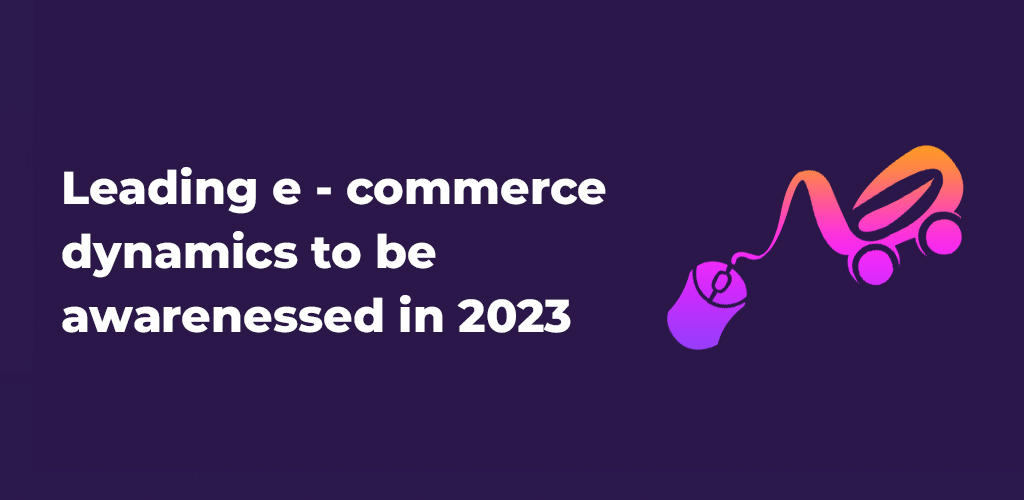Leading e – commerce dynamics to be awarenessed in 2023
Ecommerce, or electronic commerce, has expanded tremendously over the years, with technological improvements playing an important part in its development. Here’s a quick rundown of how ecommerce has evolved:
Early beginnings: The origins of ecommerce may be traced back to the 1960’s, when firms began sharing business paperwork via digital transmission of data (EDI).
Online purchasing: Very first online ordering system was developed in the 1970s, but ecommerce did not take off until the World Wide Web became popular in the 1990s. Amazon as well as eBay were among the first online markets, having launched in 1995 and 1996, respectively.
Secure payments: Among the most significant impediments to ecommerce adoption was a lack of safe payment processing. The latter transformed in the 1990’s with the advent of SSL encryption, which allowed details about credit cards to be safely transferred over the internet.
Mobile Marketing: As smartphones and mobile devices have gotten more generally available, mobile commerce, or m-commerce, has surged in popularity. Consumers may now shop and buy using their smart phones.
Social commerce: With the development of features such as shopping posts and in-app purchases, social media platforms have also become a popular route for online shopping.
Technological innovations: Developing technologies such as artificial intelligence, virtual and augmented reality, and voice assistants are transforming e – commerce platform by creating new options for merchants to communicate with customers and create personalised experiences.
Nevertheless, ecommerce has gone a long way from its early days and will continue to adapt as technology advances and customer behaviour evolves.
Understanding about new developing eCommerce tendencies is vital for various reasons:
- Remain competitive: By staying up to date on current ecommerce trends, you can stay ahead of the competition and guarantee that your company is meeting your clients’ requirements and expectations.
- Improve the customer experience: ecommerce trends frequently focus on ways to improve the customer experience, such as quicker delivery times, more personalised shopping experiences, and simpler checkout processes. Understanding these patterns can help you improve your clients’ experiences and raise customer satisfaction.
- Enhance efficiency: Developing ecommerce trends frequently entail the adoption of new technology or procedures that can increase the efficiency of your business operations, such as inventory management, order fulfilment, and customer support.
- Boost income: Adopting new ecommerce trends can lead to greater revenue since you can enter new markets or provide new products and services to match changing client wants.
- Future-proof your business: Staying up to date on developing eCommerce trends will help you future-proof your business by allowing you to predict market changes and modify your business accordingly. This can assist assure your company’s long-term profitability and long-term viability.
Taking into account present patterns and data, the following are some potential ecommerce trends that might arise in the United Kingdom in 2023:
- Continuing expansion of mobile commerce: As smartphones and tablets become more popular, customers are increasingly adopting mobile devices to purchase online. More mobile-friendly ecommerce websites and applications, as well as new mobile payment solutions, may be expected in 2023.
- Increasing usage of artificial intelligence: AI technology is getting more advanced, and ecommerce organisations are using it to improve the consumer experience. More AI-powered chatbots and virtual assistants, as well as tailored product suggestions and targeted marketing efforts, may be expected in 2023.
- Customers want a smooth buying experience across several channels, including online, in-store, and mobile, as omnichannel retail expands. More retailers will invest in omnichannel tactics, such as click-and-collect and buy online, pick up in store, in 2023. (BOPIS).
- Increased emphasis on sustainable growth: As customers become more aware of environmental challenges, they are becoming more mindful of their purchasing habits. More ecommerce firms will prioritise sustainability in 2023, such as utilising eco-friendly packaging and giving carbon-neutral shipping alternatives.
- Augmented reality integration: Several ecommerce organisations are incorporating augmented reality (AR) technology to give a more immersive buying experience. More businesses will integrate augmented reality (AR) into their websites and applications in 2023, allowing buyers to virtually try on things and imagine how they will appear in their households.
If you have gone through the emerging trends, AVASAM is a platform to look forward.







DropShip products from verified suppliers to diversify your inventory and scale your eCommerce business